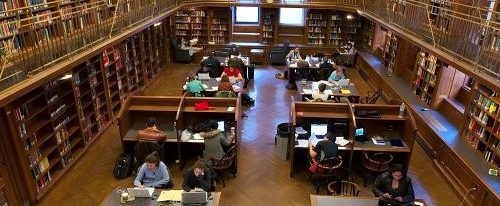At Columbia’s “Research Without Borders” program last week, panel-goers were exposed to the “Big Open Data” phenomenon from three distinct vantage points. The first panelist was David Wrisley, an English professor at the American University of Beirut and a Medieval Fellow at Fordham’s Center for Medieval Studies. His research focuses are medieval comparative literature and the digital humanities. Wrisley’s approach…
Category: Resources
“Tibetan in Digital Communication: Corpus Linguistics and Lexicography” with Dr. Nathan W. Hill (Columbia University, October 30, 2014)
On October 30, 2014, a presentation titled “Tibetan in Digital Communication: Corpus Linguistics and Lexicography: Using an annotated corpus to facilitate the philological study of Tibetan texts” was given at Columbia University’s Butler Library. Dr. Nathan W. Hill of SOAS (School of Oriental and African Studies), University of London spoke on the goals, processes, and potential impacts of “Tibetan in…
“Spatiality and Digital Mapping” with Dr. David Joseph Wrisley (Fordham University, October 29, 2014)
“Spatiality and Digital Mapping” was held in Keating Hall on the Fordham University Rose Hill campus on October 29, 2014. The program was organized by the Fordham Medieval Studies Program and co-sponsored by the Digital Humanities Working Group. Roughly 15 people attended the two hour workshop. Dr. David Joseph Wrisley (@DJWrisley) is Associate Professor in the Department of English and…
“Libre Software, Libre Education” with Richard Stallman (Columbia University, October 17, 2014)
“Libre Software, Libre Education” with Richard Stallman(Columbia University, 10-17-2014) The lecture “Libre Software, Libre Education” was held in Butler Library on the Columbia University campus on October 17th. Roughly 20 people attended the event, most of whom were Columbia University students. The speaker, Richard Stallman is, according to the event description, a “Mac Arthur Award winner, Harvard alum, founder of…
Destruction and Documentation: Saving Syria’s Cultural Heritage, Elizabeth Macaulay-Lewis (CUNY, October 15, 2014)
On October 15th, The Graduate Center at the City University of New York hosted Elizabeth Macaulay-Lewis as she presented her lecture, “ Destruction and Documentation: Saving Syria’s Cultural Heritage.” The talk was co-sponsored by the CUNY Digital Humanities Initiative, Middle East and Middle Eastern American Center and the M.A. program in Liberal Studies. Macaulay-Lewis is an archeologist, educator, author and…
Protected: Manuscript Materiality Lab and Scriptorium (NYU, 10-10-2014)
There is no excerpt because this is a protected post.
What Is a Dissertation? New Models, New Methods, New Media (CUNY Graduate Center, October 10, 2014)
The Futures Initiative at CUNY Graduate Center, HASTAC@CUNY, CUNY Digital Humanities Initiative, along with distance partners that included the PhD Lab in Digital Knowledge at Duke University, HASTAC Scholars, Hybrid Pedagogy, held a forum titled What Is a Dissertation? New Models, New Methods, New Media last Friday, October 10, 2014. The forum was held at CUNY Graduate Center and showcased…
“What is a Dissertation, New Models, New Methods, New Media.” (CUNY, October 10, 2014)
On Friday, October 10th I attended, “What is a Dissertation, New Models, New Methods, New Media.” This event was a panel discussion, which was part of a series of talks put forth by CUNY as part of their digital humanities initiative. The panel consisted of five PhD candidates, who were chosen to speak because of the brilliant and innovative ways…
“Book Traces Comes to Butler Stacks” with Prof. Andrew Stauffer (Butler Library, Columbia University, October 9, 2014)
Presented by Professor Andrew Stauffer of the University of Virginia English Department, Book Traces is ostensibly an ongoing “crowd-sourced web project aimed at identifying unique copies of nineteenth- and early twentieth-century books on library shelves.” (http://www.booktraces.org/about/) But identifying these books is really just the beginning of a multifaceted process that bears fruit in both pedagogy and digital scholarship, and has important…
“Urban Humanities: A Symposium on Research Development, Digital Archives, and Documentary Practices” (NYU, May 13, 2014)
The Humanities Initiative at NYU held the URBAN HUMANITIES: A Symposium on Research Development, Digital Archives, and Documentary Practices to promote awareness of existing initiatives in New York City, and to foster the development of new work in urban humanities. Two of the main questions addressed during this symposium were, “What new opportunities for multidisciplinary collaboration do digital tools afford…
